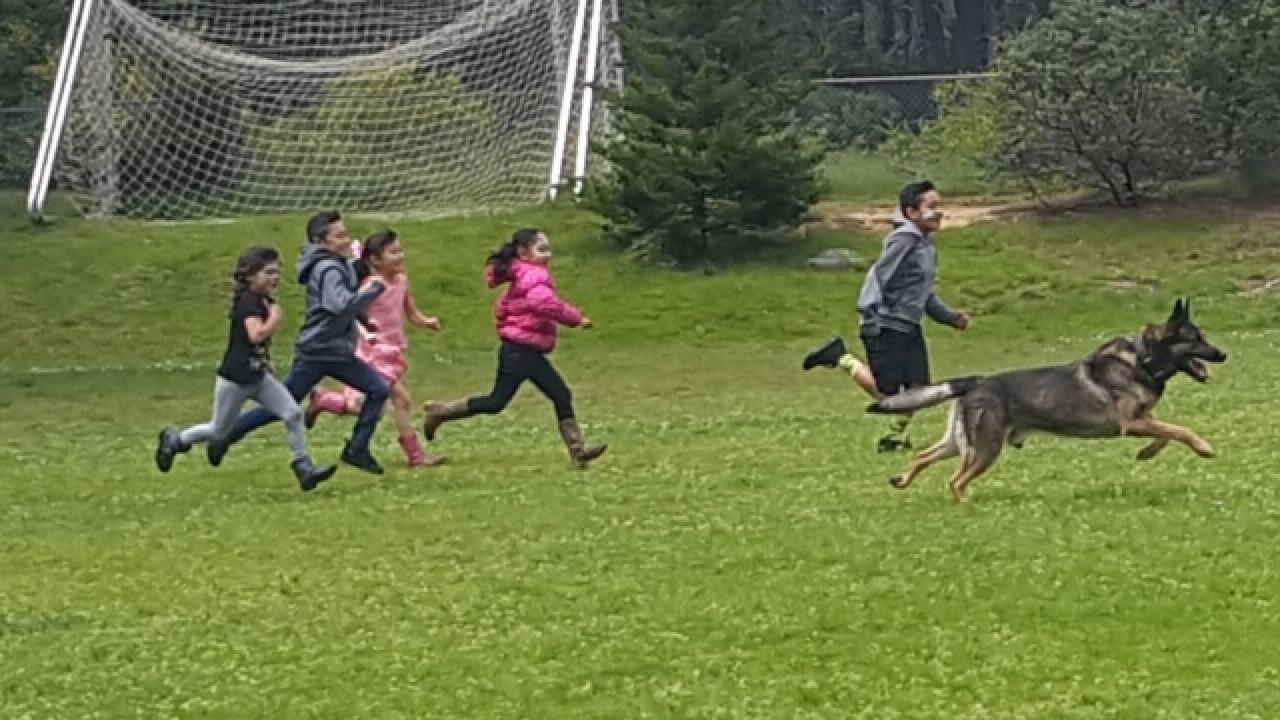
UC Davis Aids Long-Serving K-9 Officer
Wildlife Officer Paul Cardoza, a game warden with the California Department of Fish and Wildlife (CDFW), refers to his partner, K-9 Kilo, as his most trusted piece of equipment. The pair have been together for 11 years. So, when Kilo, a 13-year-old male German shepherd/Belgian Malinois mix, was having trouble walking and supporting himself on his hind limbs, Cardoza sought out the specialists at the UC Davis veterinary hospital.
“I will move Heaven and Earth to do anything I can for that dog,” said Cardoza. The love and respect he has for his partner is abundantly apparent the moment he begins to talk about Kilo. Their human-animal bond is as strong as any two could be.
After an MRI and other tests, Kilo was diagnosed with intervertebral disc disease, causing spinal cord compression. This is a degenerative disease of the intervertebral discs (cartilage between vertebrae), which normally act as a cushion between each vertebra. As the disc becomes mineralized or calcified over time, the abnormal disc material in the center extrudes out towards the spinal cord, resulting in compression, bruising, and sometimes bleeding around the spinal cord and subsequent neurological signs like Kilo’s inability to walk.
UC Davis neurosurgeons were able to perform surgery to remove the disc material that was compressing Kilo’s spinal cord.
Even though Kilo had decreased motor function in his hind limbs at initial presentation, he has shown steady improvement since his surgery. With good motor function in his hind limbs, he is able to walk again, and his veterinarians expect a functional recovery for Kilo over the next several months. Most spinal cord injuries can take up to nine months to fully heal.
Kilo’s work with Cardoza included several dangerous activities as a game warden patrol officer. He accompanied fellow officers on countless drug raids of marijuana grows on public and private land and even kept other officers from being shot by quickly apprehending a suspect before he was able to draw a weapon. The hundreds of pieces of evidence he found over the years included one piece that helped clear a man of murder charges.
“He has given his entire life to serving the people of California and his fellow officers,” said Cardoza. “He’s a priceless resource. I owe it to him to do the best I can for him.”
Kilo has one of the most impressive careers of any K-9 officer. In his 11 years of service with CDFW, he has more than 5,000 hours of training, 50 public demonstrations, 2,500 search missions, 400 pieces of evidence found, 700 arrests, and 1,000 special patrols assisting other agencies.
He has received many commendations from local police departments and sheriff’s offices, as well as from the California Highway Patrol and the U.S. Forest Service. He was nominated for Officer of the Year by CDFW and was even recognized by the California Senate.
“He’s a great bridge between us and the community,” Cardoza said. “Everywhere we go, the community wants to meet him and pet him.”
Kilo’s care at UC Davis was covered by the Faithful Partner Fund, a donor-funded resource to assist with the medical costs of treating K-9 officers, as well as search and rescue dogs, injured in the line of duty. The UC Davis veterinary hospital has a long history of caring for K-9 officers, and routinely offers free annual teeth and eye examinations for K-9s.
“I can’t say enough about how important the Faithful Partner Fund is to working K-9s,” said Cardoza. “The donors stepped up to help us when we needed it most. I feel forever indebted to that fund.”
Most law enforcement agencies do not have specific funding budgeted for K-9 healthcare. The majority of medical costs are most often borne by the K-9’s handler and/or from contributions by the officer’s unit.
To ease that burden, the Faithful Partner Fund was initially started by matching $25,000 contributions from both UC Davis’ School of Veterinary Medicine and Police Department. As those funds can quickly be depleted, the program welcomes contributions from its veterinary partners, the public, law enforcement agencies, and federal search and rescue groups. To learn more about the Faithful Partner Fund and to contribute, please go to www.vetmed.ucdavis.edu/faithfulpartner.
# # #
